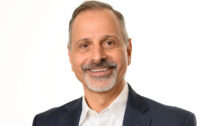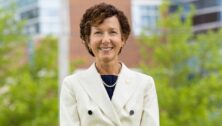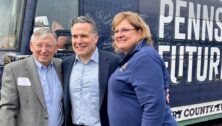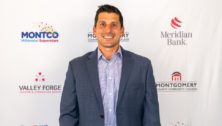Montgomery County Leadership: Gary Liguori, Chancellor and Dean, Penn State Abington
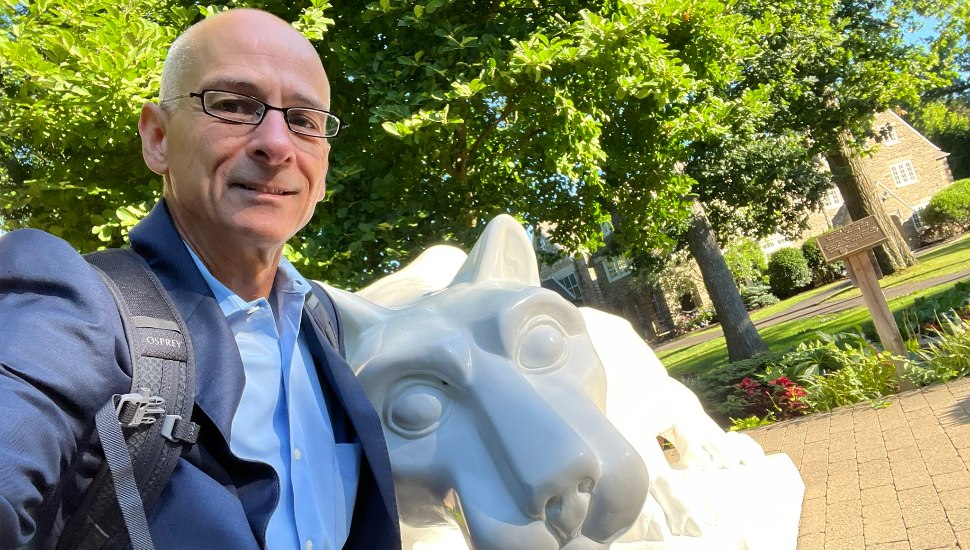
Gary Liguori, Chancellor and Dean at Penn State Abington, spoke with MONTCO Today about growing up on Long Island, where his interest in running earned him a college scholarship. However, as a first-generation college student, he struggled academically and dropped out before eventually returning years later to earn his bachelor’s, master’s, and doctorate.
Liguori discussed Penn State Abington’s efforts to support students from nontraditional backgrounds and raise awareness of a college that is sometimes considered a hidden gem. He also talked about influential mentors and his changing perspective on parents’ involvement in college students’ lives.
Where were you born and where did you grow up?
I was born the third of four boys in Brooklyn, but I grew up on eastern Long Island.
What did your parents do?
My dad had a heart attack when he was 35 years old. He also dropped out of high school in ninth grade, so we struggled a bit as a family. He ended up working for the Board of Elections in Suffolk County for about 30 years.
My mom mostly stayed home and helped raise four boys — that was a handful.
What memories stay with you from growing up in Suffolk County?
We had a lot of great friends in the neighborhood, so we played outside every day, year-round. We also had a family that ate dinner together every night, and it was a rare night when we weren’t laughing excessively.
We lived across the street from a huge state park. As I got a little bit older, I got into running. Running in the forest is still special to me. My next older brother, the second oldest, also got into running. We were pretty good runners and both earned college scholarships for running.
How did you get into running?
It was strictly following in the footsteps of my older brother. At first, I was very bad, but I quickly found my way.
I remember when I was a sophomore, my cross-country times beat his senior times. It turned out I was better at longer distances and he was more of a mid-distance. I never beat his mid-distance times, but it was really special running with him briefly in high school.
Is there a race you remember as if it were yesterday?
Our county was pretty competitive. You had to win the county or be in the top two to qualify for state. In my senior year, I ran terribly at the conference meet, which preceded the county championships.
But I took the lead in the mile at the county championships and led the whole way. I remember, on the last lap, thinking, “My gosh, I’ve finally done this.” I made the fateful mistake of slowing and raising my arms at the finish as some guy beat me. I still qualified for the state meet, so it was fine. But I had the race won until literally the last step.
What kind of part-time jobs did you have in high school and college?
My parents, surprisingly, said that if we were going to be involved in sports, there was not enough time to do sports, a job, and school, so I only worked in the summers. I was a Counselor at local summer camps for little kids. Occasionally, I worked at the beach or the lake, usually just doing garbage pickup.
What kind of music did you listen to in high school, Gary?
Similar to following my brother into running, I followed him into music, and we are die-hard Neil Young fans. We loved listening to Neil Young, and still do to this day. If things are a little tense in the house, my wife will say, “Okay Google, play some Neil Young.” And my lullaby songs to my kids were Neil Young songs.
Did you ever see him in concert?
I did. In fact, the first concert I ever saw was Neil Young and the International Harvesters at the Grand Ole Opry House.
And I love ’70s rock music: Zeppelin, The Rolling Stones, and Van Halen.
You could have gone anywhere for college. You were a good student, I presume, and you were certainly a great athlete. Where did you go, and why there?
We had no guidance around college. I ended up at a community college on Long Island that had a strong reputation for running. They had a great cross-country coach who was a ‘72 Olympian. I had a strong freshman year, and I got an offer for a scholarship at a Division I school in Tennessee.
That whole time, I was, at best, skating by academically. I wasn’t prepared. As my running times went down, so did my grades.
After my first semester at the Division I school, I was in over my head running at Division I, and I was way in over my head academically. I left college and really struggled for about five years until I met a girl from Missouri who took me to college there at the University of Central Missouri. It was the right time and the right place. In Division II, I could run well. I got motivated for school and did exceptionally well.
What about graduate school?
I applied for only about four or five programs around the country, including one I was hoping to go directly into a Ph.D. program, but I didn’t get accepted. So I went to East Stroudsburg University. They have a great reputation for their graduate program in cardiac rehabilitation, which is what I majored in, which is grounded in exercise science. That’s my background. It was a great experience.
I took a job in California, worked for a bit in the heart field, and then got offered a job at the University of Wyoming. I thought, “Oh my gosh, Wyoming, mountains, mountain running, trail running, and I could be a faculty member? This is a dream come true.” That’s how I got into academics. Eventually, I went back and got my Ph.D.
Looking back over your career, Gary, who were the people who saw promise in you and gave you opportunities that at the time you may not have deserved?
Well, I have to start with my parents and my older brother. My parents had no concept of college. A lot of it frightened them and confused them, but they always supported whatever me and my brothers wanted to do. Whatever our interests were, we knew they had our back the whole time.
My older brother struggled too when he started college, and then he eventually finished, and he’s incredibly successful today. I’ll tell you this story. He flirted with high jumping and pole vaulting in high school, even though he was a great half-miler. Our coach let him take a high jump mat home one summer. He and I would go in the backyard every day and practice. We had these old standards, which is where the bar sits. One side often slipped down, and I would fix it by lowering the other side. And my brother said, “No, don’t lower that side, raise this side. That’s how you’re going to get better.”
I realized that he was telling me more than just about high jumping. It was an analogy to life, and he’s always been that mentor to me.
As an undergrad, I had a Faculty Member named B. Joyce Bailey who gave me the right opportunity at the right time. My senior year was her last year before retiring, and she kind of said “screw it” to the administration and gave us opportunities she probably wasn’t supposed to.
I also had a Graduate Assistant Teacher whose name was Gary Poteet. I wanted to apply for an internship at one of the premier places called the Cooper Institute in Dallas, Texas. I had no business applying there; we didn’t even have a lab in our undergrad program. He said the classic line to me, which I’d never heard before: “If you don’t apply, the answer’s no.” So, I applied and got waitlisted, and then I got in. That changed the entire trajectory of my professional life. It was an amazing experience.
What brought you to Penn State Abington?
I was in Florida, so I was looking for somewhere a little less government-controlled and in a system that was strong. The opportunity to be part of the Penn State system and to run a campus in the Northeast (most of my family’s still in the Northeast) was an amazing opportunity.
When I was here interviewing, I recognized that the students who came to Abington were similar to me 35 or 40 years ago. These were kids coming from similar backgrounds. My family struggled at times. My brothers and I still joke about eating government blocks of cheese and drinking powdered milk. But education completely changed my life and the future of my children and grandchildren. And I saw that here.
Penn State Abington is a special place for me because it resonates with who I am. If I can change one student’s life similarly, I’ll have been successful.
So, what are your priorities? What are you focused on?
Penn State itself is going through a lot of changes that are typical post-COVID across American higher education. But within that, we still have lots of opportunities to improve how we serve students. Those same students I mentioned, we want to continue to recruit them. We want to continue to support them and show them the opportunities available to them with a Penn State degree.
If people have been to our campus, there’s a misperception that because we sit in such an affluent neighborhood, that our students are also affluent. That’s not the case. The median household income of the students at University Park is more than double the median household income of our students. That doesn’t mean our students are any less qualified to be here, they’re just coming from different backgrounds. I want to make sure we’re supporting that.
We’re known for having a beautiful campus, too. But I want to extend that narrative because that’s not why you send anyone to college, right? We have 25 academic majors you can complete on our campus that are affordable and a Penn State degree is a Penn State degree. We have a pretty small student-to-faculty ratio. We are the most diverse campus in the entire Penn State system, and we are committed to supporting our students. These are things that resonate with people and why they want to come to our campus.
The faculty and staff are here to support our students, and I can feel that every day. So my goal, first and foremost, is to continue to reinforce that culture and make sure that people on the ground know how much we believe in what they’re doing. That’s especially important today as Penn State campuses are working on long-term strategies to serve students and our communities, really living up to the land grant mission of the university. Supporting our people, making sure our students have great opportunities, and raising awareness of who we are here are my priorities.
I also want to engage our local and broader community in helping support them in different ways, creating internships and co-ops. It’s nice that some people refer to our campus as a hidden gem, but anything hidden is a disadvantage. We’re working on getting out into the community more.
And finally, I’m always looking for big opportunities and not being afraid to still take some calculated risks. We’re going to look at extending ourselves a little bit — but doing it strategically. There’s probably more we can do in the healthcare sector. We’re also just beginning construction on a new academic building, the first in 50 years, that we know is going to serve our campus and community well.
What do you do with all that free time that you have, Gary?
I’ve been exploring the trails around the area. I love trail running, so I’m exploring that a lot. I’ve always loved pretzels, so I’m enjoying going around and tasting the different pretzels. I like sports, so going to different sporting events will be fun. I just went to my first Penn State football game. I’d like to visit a lot of the other campuses around Philadelphia.
Three last questions for you, Gary. What’s something important you’ve changed your mind about over the last 10 years?
Meeting students where they are. I came up as a faculty member, and we sort of have this belief that students are adults now, and they need to stop doing this and that and the other.
I had this conversation last weekend with my wife, who’s been on the student support side of higher ed her whole life. No switch’s flipped when you turn 18. She’s convinced me that if a student wants their parents involved, by gosh, let the parents be involved. That’s their number-one support network. It’s one thing if the parent calls a faculty member to complain. But when a kid is in advising or financial aid or counseling, and they want their mom or dad there, bring them in.
You hear about administrative bloat in higher ed, but realize that the support services have expanded exponentially because we are seeing so many different students in higher ed now than we used to, and Abington is a great example of that. If we want our entire country to flourish, particularly from an economic and social standpoint, we need to support higher education for all students. And to do that, we need to provide these kinds of support services that are going to let them be successful.
I was that kid. I had no idea what I was doing in college, and I flunked out in three semesters. I also couldn’t afford to buy books. I remember taking Spanish Two without the book. Today, we’re going to either make sure the course doesn’t require a book and find other resources, or we’re going to get that kid a book. That costs us more, both literally and figuratively, but the return is so important.
What keeps you hopeful and optimistic? It’s a crazy world out there.
I am wildly optimistic about everything, including the Mets’ chances this year as we talk in late September. I believe there’s good in everything and everyone, and we’ll find a way to get there. But as I said earlier, the focus of my optimism is to change the trajectory for one kid, and then build on that and make it two kids, and then make it three, and so on.
I believe in higher education, of course. I wouldn’t be sitting here if I didn’t. I think we’ll weather the rhetoric that’s out there now — higher ed always has — and people will see its value and continue to support what we do.
I think what I’m most optimistic about — I have three teenage and young adult children — is their generation. They are an amazing generation. In my experience, they care about our environment, they care about our people, and they care about each other. I feel hopeful that they’ll take hold of that power and opportunity and get out and make the world better. I’m looking forward to stepping aside and handing it over to them and saying, “Go for it.”
Finally, Gary, what’s the best advice you’ve ever received?
“If you don’t ask, the answer’s no.”
That was from my Teaching Assistant, Gary Poteet, at the University of Central Missouri. I think of that almost every day, and I’ve said it to so many people. You’ve got to pursue, and then when you get the opportunity, do your darnedest to make everything of it.
Stay Connected, Stay Informed
Subscribe for great stories in your community!
"*" indicates required fields



















![95000-1023_ACJ_BannerAd[1]](https://montco.today/wp-content/uploads/sites/2/2023/03/95000-1023_ACJ_BannerAd1.jpg)






![ForAll_Digital-Ad_Dan_1940x300[59]](https://montco.today/wp-content/uploads/sites/2/2022/06/ForAll_Digital-Ad_Dan_1940x30059.jpg)










